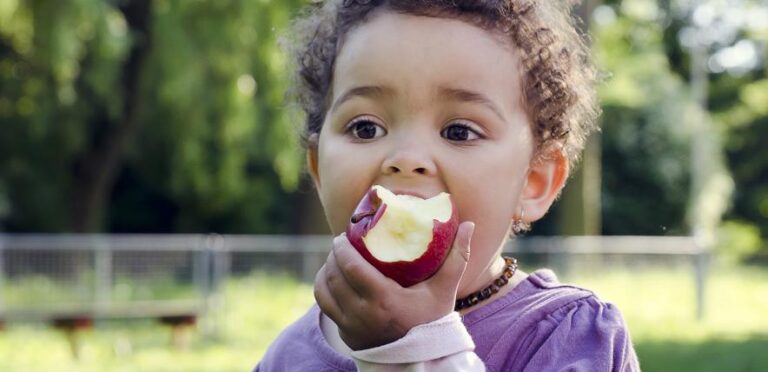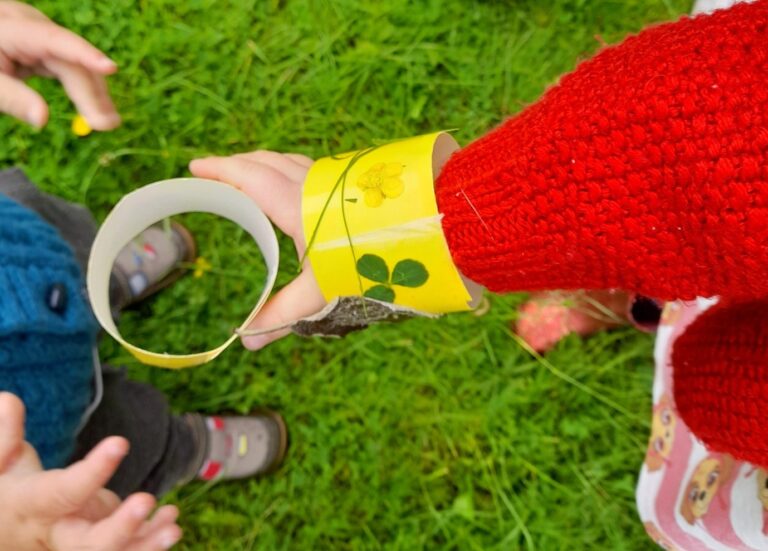Early childhood is a time when habits are formed and consequently diet is really important. There are usually phases of food refusal to negotiate, frustrating your best efforts at a balanced diet, but persistence is important. When the healthy food you give your child every day is spat out, returned untouched or tipped on the floor, it can be tempting to curb the waste and give up. Don’t. Always offer healthy food, especially fruit and veg, with every meal. At the very least this instils in your child the concept that fruit and veg is an integral part of every meal, and with luck that will eventually translate into a willingness to try most of what you dish up.
Babies and toddlers don’t eat much as their tummies are still very small. That makes it all the more important to feed them the right foods, so that as many vital nutrients as possible are packed into those tiny meals. Young children develop at an astonishing rate, growing and learning new skills almost daily. All of this requires a rainbow of vitamins and minerals as well as a lot of energy. This is one of the most important times in life to ensure that your child is getting a balanced diet. Here are our favourite superfoods for preschool children, together with some inspiration to get your child to eat them.
Avocado
Full of good fats, vitamin E, and soluble fibre. A perfect food for growing brains, eyes and skin. The ideal texture for babies, and so easy to mash onto toast, slice into finger food or whizz into smoothies. Nutritious and versatile.
Eggs
So many nutrients in each handy portion. Rich in protein, omega 3’s and B vitamins, eggs are packed with energy and goodness. If your child doesn’t seem keen on unadorned egg, try pancakes, French toast, quiche or Spanish omelette.
Green leafy veg
Calcium, iron and vitamin K not to mention fibre, all great for developing bones, brains and blood vessels. Layer into veggie lasagne, whizz into pesto or mix into cheese sauce for pasta.
Sweet potato
This is a gift for parents. One of the most nutritious foods there is, rich in several vitamins and minerals as well as boasting anti-inflammatory properties. Not only is it a nutritional powerhouse, it also has a creamy texture and a sweet taste. Children love it mashed, roasted and grated into soups, pasta sauces or anything else that needs a gentle sweetness.
Blueberries
All berries are great sources of fibre and vitamin C, but what marks blueberries out is their high antioxidant content, great for defending against pollutants. Fun to eat raw, blend into smoothies, or to add to muffins and pancakes.
Yogurt
With twice the protein and half the sugar of standard natural yogurt, go Greek for maximum nutrient impact. Yogurt is very filling, packed with calcium, and more easily digested than milk. Add to sauces, blob onto cereal, a bowl of fruit or into smoothies. Or eat on au naturel.
Oats
Plenty of protein and lots of slow-release carbs make oats into a superfood. Those carbs deliver energy over a long period: no sugar spike means no grumpy, difficult sugar crash. Oatcakes are a brilliant, nutritious alternative to crackers or biscuits, and porridge is a wonderful comfort food. Jazz up with fruit, yoghurt, nuts or seeds or honey.
Red meat
Hard to retrain our out of date brains that red meat is no longer considered the danger zone it once was. For young bodies it is an excellent source of protein and easily absorbed iron, which is essential for all stages of childhood growth. Aim for 2 – 3 portions a week. Bulk meat up with masses of grated veg and make into bolognese, stews, meatballs or burgers.
Oily fish e.g. Salmon
Omega 3 fats, vitamins D and B12 are all essential building blocks for the growing body, but have a particularly beneficial effect on mood and memory.
Tomatoes
Nurture a taste for tomatoes in early childhood as these ubiquitous fruits are brilliantly beneficial for all. Brimming with Lycopene, a powerful anti-cancer nutrient, and rich in vitamin C, tomatoes are a key component of any healthy diet.
So, whether you are starting to introduce new tastes to your baby or trying to convince a toddler to eat his greens, keep in mind the fact that what your child eats in the early years is likely to set a pattern for their lifelong dietary habits. Make sure some of these superfoods are among the regular flavours they are exposed to.
Written for The Pre-School Learning Alliance by Martha Hales.
For more information on children’s nutrition, visit The Infant and Toddler Forum.











